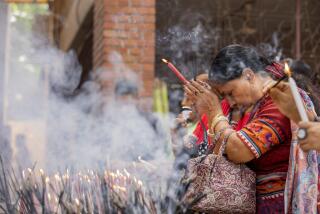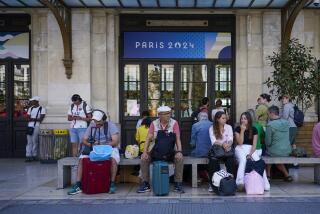Train Attack Kills 57 in India
- Share via
NEW DELHI — An enraged Muslim mob torched a train carrying Hindu nationalists Wednesday, killing at least 57 people and sparking fears of more violence over a dispute rooted in the destruction of a mosque a decade ago.
At least 14 children died in the morning arson attack on the express train after it stopped at a station in the town of Godhra, in India’s western Gujarat state. About 65 more passengers were injured, 38 critically, in the inferno that gutted four coaches and charred some victims beyond recognition, reports from the scene said.
India’s government urged calm as it increased security in an effort to prevent revenge attacks between the country’s majority Hindus and its Muslims. With military tensions between India and its Muslim neighbor Pakistan still running high, and nearly a million soldiers facing each other across the border on high alert, Indian Prime Minister Atal Behari Vajpayee can ill afford widespread unrest within the country.
“An inquiry is being held and we will ascertain facts [about] what happened, and why did it happen,” Vajpayee said. “But from the preliminary reports, it appears that the train was stopped, maybe because slogans were being shouted in the train. And clashes took place.”
This morning, a Godhra official said 51 people had been arrested on accusations of arson, rioting and looting, Reuters news agency reported. It said 29 others had been detained for questioning.
There were contradictory accounts of what sparked the train attack.
Hindu activists said that in an unprovoked attack, Muslims had assaulted supporters of the campaign to build a Hindu temple on the site of an ancient mosque destroyed by a rampaging Hindu mob Dec. 6, 1992.
But quoting witnesses, the Associated Press reported from Godhra that the four coaches were set ablaze after a crowd of Hindu nationalists jeered and attacked Muslims as the latter got off.
The government sent in paramilitary troops to reinforce those already guarding the disputed holy site at Ayodhya, 345 miles southeast of New Delhi, in the eastern part of the northern state of Uttar Pradesh. Thousands of Hindu extremists are threatening to defy a court order and start rebuilding an ancient temple there March 15.
“We need to protect Indian brotherhood at every cost,” said Vajpayee, whom opposition parties have accused of letting the Ayo-dhya dispute fester far too long in the hope of gaining political advantage among Hindu nationalists. Vajpayee is a member of the Hindu nationalist Bharatiya Janata Party, or BJP.
Passengers on the train included hundreds of activists returning from Ayodhya, where thousands have gathered to press their cause. They insist that the mosque, known as the Babri Masjid, which Hindu extremists tore down brick by brick, must be replaced by a temple marking what they say is the birthplace of Rama, an incarnation of the Hindu god Vishnu.
They say Mughal emperor Babar destroyed the Ram temple in the 16th century and replaced it with the mosque that the Hindu mob demolished in 1992. Many Muslims believe that is a myth rooted in Britain’s former colonial policy of “divide and rule” on the subcontinent.
More than 140 million of India’s 1 billion people are Muslims, and while the official policy of maintaining a secular state has kept religious tolerance strong, communal strains constantly threaten to erupt into violence. When trouble starts, it can spread across the country like a wildfire.
Between 2,000 and 3,000 people died in nationwide rioting that followed the destruction of the Babri Masjid in 1992.
At least 14,000 activists from the right-wing Vishwa Hindu Parishad have gathered outside the heavily guarded site of the demolished mosque, and their leaders claim that hundreds of thousands will be there by March 15.
The activists have already started preparing construction materials despite Vajpayee’s insistence this week that his government would prevent any changes at the site until negotiations or a court order settles the dispute.
A state police report on the 1992 mosque demolition named Lal Krishna Advani, now Vajpayee’s powerful home minister, and two other members of the current Cabinet as fomenting the violence in a speech to the mob.
A commission of inquiry is probing allegations of a conspiracy to tear down the mosque, and when Advani testified several times last year, he denied having anything to do with the destruction.
Advani joined Vajpayee on Wednesday in urging Hindu nationalists to abandon their plan to begin building the Ram temple.
“The solution to this problem will not come by a movement of this kind or by violence,” Vajpayee said. “There are only two ways: by dialogue or leave it to the courts.”
Wednesday’s violence is likely to compound Vajpayee’s political problems, just days after his party was defeated in three state elections, including in Uttar Pradesh, which had been a stronghold of his party.
On Tuesday, opposition parties brought parliament to a standstill in protest after Vajpayee said he didn’t see why supporters of the Ram temple construction should be prevented from demonstrating peacefully.
Vajpayee acknowledged, however, that his government is responsible for making sure there isn’t more violence at the holy site. But Vajpayee didn’t explain how he plans to avert another catastrophe.
More to Read
Sign up for Essential California
The most important California stories and recommendations in your inbox every morning.
You may occasionally receive promotional content from the Los Angeles Times.










